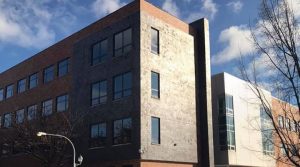10/12/2017
 Mayor Rahm Emanuel today joined Alderman Walter Burnett to break ground on the 36,000-square-foot annex at Skinner West Elementary School. The addition will be a four-story annex with 22 classrooms, including an art room, a computer room, and a science lab, as well as a multi-purpose room that can accommodate up to 120 students for lunch.
Mayor Rahm Emanuel today joined Alderman Walter Burnett to break ground on the 36,000-square-foot annex at Skinner West Elementary School. The addition will be a four-story annex with 22 classrooms, including an art room, a computer room, and a science lab, as well as a multi-purpose room that can accommodate up to 120 students for lunch.“The Skinner annex will create the extra space and facilities necessary for students and teachers so that they can continue to concentrate on their studies,” said Mayor Rahm Emanuel. “Now even more Skinner students will have the opportunity to earn a first rate education for years to come.”
Once complete, the annex will provide relief for overcrowding at the school. The addition also includes a new elevator and a chiller, as well as renovations to the existing building and landscape. The annex will be constructed by the Public Building Commission and is expected to be complete by early 2019.
“This state-of-the-art annex represents a vision for the future for Skinner students,” said Alderman Walter Burnett, 27th Ward. “This is an important investment for our children, and would not have happened without the hard work and dedication of our community.”
Mayor Emanuel and CPS have addressed overcrowding at over 35 local schools in recent years, including Zapata, Dore, Dawes, South Loop, Prussing, Addams, Little Village, Bridge, Onahan, Ebinger, Pasteur, Canty, Byrne, Edwards, Dore, Garvey, Hale, Peck, Stevenson, Dirksen, Sauganash, and many more. The Mayor remains committed to working with communities to find innovative ways to relieve overcrowding.
The City of Chicago has been committed to broad investment in capital projects at schools across the city. Investments with CPS has included new schools and annexes, playgrounds and air conditioning, improvements and access to technology, new computers and expanded bandwidth, expanded academic programs and core facilities investments.
###
